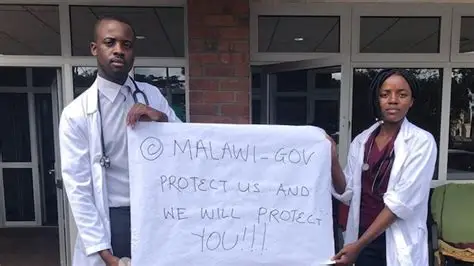Malawi Struggles with TB Drug Shortage Amid Funding Cuts
By Isha - Sep 01, 2025
Malawi faces a critical shortage of tuberculosis drugs due to aid cuts, risking progress in combating the disease and raising concerns about drug-resistant strains. The reduction in funding threatens the already fragile healthcare system, emphasizing the urgent need for donor countries to reassess their aid priorities to prevent a wider healthcare crisis with significant implications for public health and the economy.

Image by Times 360 Malawi Twitter page
,[object Object], is on the brink of a severe crisis as the country grapples with a looming shortage of ,[object Object],. Health officials have sounded the alarm that the current drug stocks are expected to be depleted by the end of September, leaving clinics in a desperate situation of having to ration drugs and testing services. This crisis comes shortly after the World Health Organization (WHO) reported a promising 40% decrease in TB cases in the country over the last decade.
The shortage of TB drugs in ,Malawi, is attributed to significant aid cuts from major international donors, including the ,[object Object], and the ,[object Object],. The reduction in funding has exacerbated an already fragile healthcare system, putting the progress made in combatting tuberculosis at risk. With clinics being forced to ration drugs, patients are facing uncertainty and potential gaps in their treatment, raising concerns about the reemergence of drug-resistant strains of the disease.
The geopolitical implications of the aid cuts on ,Malawi,'s healthcare system are profound. As one of the world's poorest countries, the nation heavily relies on external support to sustain vital health programs. The sudden withdrawal of funding jeopardizes not only the fight against tuberculosis but also undermines broader efforts to improve public health outcomes in the country. Experts emphasize the urgent need for donor countries to reassess their aid priorities to prevent a healthcare crisis with far-reaching consequences.
The impact of the TB drug shortage extends beyond immediate health concerns and delves into the economic sphere, with potential ripple effects on ,Malawi,'s overall well-being. The disruption in essential healthcare services could lead to increased mortality rates, higher treatment costs, and a setback in the progress achieved in controlling infectious diseases. As ,Malawi, races against time to secure alternative funding sources, the global community faces a moral imperative to step up and support the nation in its battle against tuberculosis, safeguarding not only public health but also regional health security.


